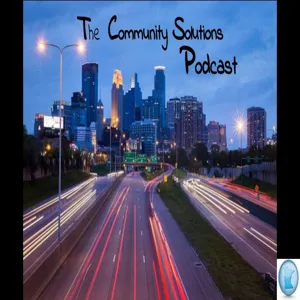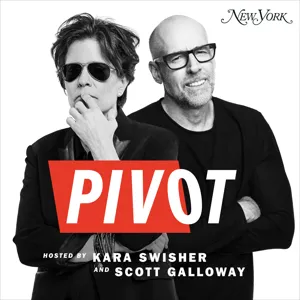Podcast Summary
Decrease in Urban Spending due to Remote Work: Remote work causing $12B+ annual decrease in urban spending on meals, shopping, and entertainment in cities like NY and DC, posing challenges for urban areas and requiring new ideas for their future vitality and economic health.
The shift to remote work has led to a significant decrease in urban spending, with Manhattan workers spending over $12 billion less per year on meals, shopping, and entertainment due to working from home 30% of the time. This trend, which is transforming urban life, poses challenges for American cities and requires new ideas about what and who is at the center of urban life. The quiet offices in New York and Washington D.C. are a concerning sign for those who care about the future of cities, as the pandemic continues to keep people away from their workplaces at pre-COVID rates. This phenomenon, referred to as the "doom loop," raises questions about the future vitality and economic health of urban areas.
Remote work trend could lead cities into a 'doom loop': Cities may face declining tax revenue, reduced benefits, and more people moving away due to remote work, leading to a downward spiral of higher taxes or reduced services, perpetuating the cycle.
The trend of remote work could potentially lead cities into a "doom loop," a downward spiral of declining tax revenue, reduced benefits, and more people moving away. This concept, popularized by real estate professor Stan Van Neuwerburg, suggests that as property values decrease due to fewer offices and urban retail, cities will need to find alternative sources of revenue or make cuts. This could lead to higher taxes or reduced services, making the city less attractive and perpetuating the cycle. This phenomenon isn't entirely new, as some cities, like Cleveland, experienced similar challenges roughly 50 years ago. The impact of remote work on cities is a pressing concern for major urban areas like New York, Chicago, Seattle, and San Francisco. And for those of us who live in and love these cities, it's a personal challenge to navigate our roles in their future success.
Urban Ecosystems and the Impact of Deindustrialization: The shift from industrial to office jobs and service industries in big cities required a strong tax base to fund essential services and opportunities for all residents. The COVID-19 pandemic disrupted this delicate financial ecosystem, causing the most significant impact on the working class sector.
The era of deindustrialization in America's big cities was a significant blow to their urban ecosystems, leading to population declines and the rise of office jobs and service industries. However, this shift required a sufficient tax base to fund essential services and opportunities for all residents. The upswing started in the 1990s and lasted until COVID-19, which brought about a short-term disaster for big cities by disrupting the delicate financial ecosystem built on office workers commuting to downtown cores. The focus on middle and upper middle class workers' shift to remote work has caused the brunt of the impact to fall on the working class sector. To ensure cities provide opportunities for everyone, a sufficient tax base is necessary to fund schools, public services, and keep the city growing.
Impact of COVID-19 on Commercial Office Space Values: The COVID-19 pandemic is causing a significant decline in office occupancy rates, reducing the value of commercial office space in the US by nearly half a trillion dollars. Cities must adapt to accommodate remote work and flexible living arrangements to mitigate the effects.
The COVID-19 pandemic has led to a significant decline in office occupancy rates in major cities, with many companies opting for remote work or shorter-term leases. This trend is estimated to reduce the value of commercial office space in the US by nearly half a trillion dollars. The impact of this shift extends beyond the office market, affecting industries such as public transit, hospitality, and commercial real estate. To mitigate the effects, there is a consensus among experts to redesign cities to better accommodate remote work and flexible living arrangements. This could represent a major shift akin to the move from industrial to office work. Meta, the parent company of Facebook, is one example of a large corporation spending billions to exit office leases. The full implications of this trend are yet to be seen, but it is clear that cities will need to adapt to this new reality.
Shift focus from city as job hub to livable place: Improving waste management can make cities more appealing, leading to better living conditions and resident retention
Prioritizing a city as a great place to live, rather than just a hub for jobs, could lead to significant improvements in urban centers. This shift in focus could lead to better management of issues like trash on the streets, which can act as a disincentive for residents to stay. The example given is New York City, where the lack of proper waste management infrastructure results in businesses stacking garbage outside their premises. By addressing this issue, cities can make their living conditions more appealing and attract and retain residents. This change could lead to a more balanced urban landscape, with less focus on commuters and more on the needs of local residents. Additionally, for entertainment, the new FX series "The Veil" on Hulu is worth checking out for fans of spy thrillers and Elisabeth Moss.
Revitalizing Urban Areas with Affordable Housing and Amenities: Transforming empty offices into affordable housing with retail and amenities can revitalize urban areas, attract residents, and boost local economies.
Converting empty office spaces into affordable housing with retail and other amenities can revitalize urban areas and address housing crises. This solution has been successfully implemented in the past, such as in Manhattan's Financial District. In the 1990s, New York City faced a similar issue with commercial real estate vacancies due to the financial industry leaving the area. The city responded by providing tax incentives for developers to convert offices into residences, improving infrastructure, and creating more green spaces and amenities. This led to a significant increase in population and the residentialization of the area. The recent trend of remote work and office vacancies presents an opportunity to repeat this success story. By transforming empty offices into affordable housing, cities can attract more residents, create vibrant communities, and boost local economies.
Repurposing office buildings into residential apartments: Careful planning, financial resources, and adaptability are crucial for converting office buildings into desirable residential spaces
Converting office buildings into residential apartments is a complex process with significant challenges. Older, skinnier buildings are easier to convert due to their layout, but even then, the cost can be prohibitive. Even when a building is a good candidate for conversion, the area around it may not offer desirable amenities, such as green spaces. Paul Lewis, an architect who lives in a converted office building in downtown Manhattan, shared his experience. His apartment, located in the Downtown Club, was once a gym for Wall Street workers. Although the conversion wasn't a direct office-to-apartment transformation, the principle remains the same: repurposing a space designed for 9 to 5 use into a living space. Paul and his wife, also an architect, have a beautiful apartment with large windows and a tasteful design. However, they sleep in a room without windows, technically classified as a studio or home office. This arrangement is not uncommon in apartment conversions due to the floor layout. Although they claimed to sleep well in their windowless bedroom, this might not be an ideal selling point for those prioritizing quality of life. Overall, converting office buildings into residential apartments requires careful planning, financial resources, and a willingness to adapt to unique living spaces.
Revitalizing downtowns by converting offices to residential spaces: Transforming empty offices into homes can boost local economies, make downtowns more vibrant, and help cities break the doom loop of underutilized commercial spaces.
Converting empty office buildings into residential spaces can make downtown areas more vibrant and help break the doom loop cities are trying to avoid. Paul and Kim's experience in moving back to their diverse neighborhood is an example of this. Cities like Chicago, Los Angeles, and DC are pursuing plans to subsidize such conversions. New York City is also leading a big push to convert offices into housing, with the former Goldman Sachs HQ being a potential site for this. Although it's a complex process and won't happen in many places, even a small portion of a city's downtown becoming residential can have a significant impact. Residents contribute to the local economy by shopping, using transit, and being active in their communities. This not only makes downtown more lively but also helps counteract the negative effects of empty offices and commercial areas.





